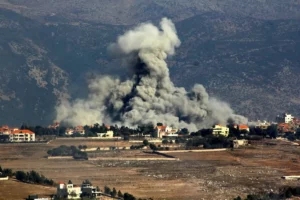Egypt is the largest Arab country, and has played a central role in Middle Eastern politics.
In the 1950s President Gamal Abdul Nasser pioneered Arab nationalism and the non-aligned movement, while his successor Anwar Sadat made peace with Israel and turned back to the West.
Egypt’s great cities – and almost all agricultural activity – are concentrated along the banks of the Nile and its delta.
The economy depends heavily on agriculture, tourism, and cash remittances from Egyptians working abroad – mainly in Saudi Arabia and the Gulf countries.
However, rapid population growth and the limited amount of arable land are straining the country’s resources and economy, and political unrest has often paralysed government efforts to address the problems.
ARAB REPUBLIC OF EGYPT: FACTS
- Capital: Cairo
- Area: 1,010,408 sq km
- Population: 107.7 million
- Language: Arabic
- Life expectancy: 69 years (men) 74 years (women)
LEADERS
President: Abdel Fattah al-Sisi

Retired Field Marshal Abdel Fattah al-Sisi was elected president in May 2014, almost a year after he removed his elected predecessor, the Muslim Brotherhood’s Mohammed Morsi, from office in a coup.
In addition to Egypt’s struggling economy, President Sisi has to deal with an Islamist insurgency on its borders with Israel and Gaza.
MEDIA

Egypt is a major regional media player. Its TV and film industries supply much of the Arab-speaking world with content and its press is influential.
TV is the favourite medium and there are several big hitters in the sector, including the state broadcaster.
The authorities have been increasing controls over traditional and social media to an unprecedented degree.
Reporters Without Borders says Egypt is “one of the world’s biggest prisons” for journalists.
TIMELINE

Some key dates in Egypt’s modern history:
1250-1517 – Mameluke (slave soldier) rule, characterised by great prosperity and well-ordered civic institutions.
1517 – Egypt absorbed into the Turkish Ottoman empire.
1798 – Napoleon Bonaparte’s forces invade but are repelled by the British and the Turks in 1801.
1805 – Ottoman Albanian commander Muhammad Ali establishes dynasty that rules until 1952, although nominally part of the Ottoman Empire.
1869 – Suez Canal is completed, but it and other infrastructure projects nearly bankrupt the country and lead to gradual British takeover.
1882 – British troops defeat Egyptian army and take control of country.
1914 – Egypt formally becomes a British protectorate.
1922 – Egypt gains independence, although British influence remains significant until mid-1950s.
1949 – Committee of the Free Officers’ Movement formed to overthrow the monarchy.
1952 – Coup sees Gamal Abdel Nasser become prime minister in 1954 and president in 1956. He sets up Egypt in opposition to the conservative Arab monarchies of the Gulf and Western interests in the Middle East.
1954 – Evacuation Treaty signed. British forces, who began a gradual withdrawal under 1936 treaty, finally leave Egypt.
1956 – President Nasser nationalises the Suez Canal to fund the Aswan High Dam, after Britain and US withdraw financing. Britain, France and Israel invade over nationalisation of Suez Canal, but withdraw at US insistence.
1967 – Israeli pre-emptive attack defeats Egypt, Jordan and Syria, leaving it in control of Sinai up to the Suez Canal and Egyptian-occupied Gaza.
1970 – Nasser dies.
1973 – Egypt and Syria go to war with Israel to reclaim land lost in 1967. Egypt begins negotiations for the return of Sinai after the war.
1975 – Suez Canal is re-opened for first time since 1967 war.
1978 – President Anwar Sadat makes peace with Israel.
1981 – President Sadat is assassinated by Islamist extremists.
2011 – Arab Spring popular uprising topples President Hosni Mubarak.
2013 – Coup ousts the Muslim Brotherhood’s Mohammed Morsi, the country’s first freely-elected president. Army chief Abdul Fattah al-Sisi takes over.

Source : BBC

















Add Comment